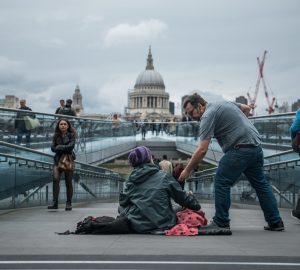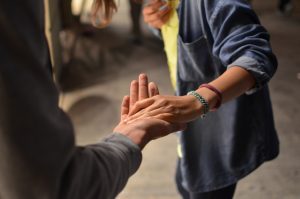Sacrifice or Fulfillment
![]()
We continue our month of inspirational pieces and sermons by congregants.
Addie Liechty is my niece, and hers is the featured image—red and green leaves—of my blog. Addie’s blog is: https://addieswriting.wordpress.com. You can view her biography below.
____________
Reflection: told by Addie Liechty at First Mennonite Church, San Francisco, 1/19/2014

Photo by Joseph Barrientos on Unsplash
I can remember the inner recoil that I would feel when the Interfaith Hospitality Network would come to our church. During this week, homeless people from the Indianapolis area would inhabit our fellowship. This meant that one of those nights, I would be taken begrudgingly to the church with my mother to prepare a spaghetti dinner. I did NOT want to go. There is no doubt that part of why I did not want to go, was due to “LBS” or “Little Brat Syndrome.”
As a child, my physical needs were exceedingly well met. I am a child of privilege and I never wanted for anything. While I think that LBS played a part in my resistance, there was another element at play. Something about it felt that the dinner was done as a ‘sacrifice.’ This was probably due to the energy in which it was approached, such as the time my mother, who had worked a full day, was in charge of three busy kids’ schedules, and remembered earlier that day—her daydream of putting her feet up violently interrupted—that tonight was the night she had volunteered to cook the spaghetti dinner. For her, this most likely was a sacrifice.
This experience stands in stark contrast to the memory of my mother in a freezing parking lot, giving a man $20.00, just because he told us his story of need and asked. In response to my wide eyes she stated, “Some people will tell you not to give people with a story money, but if he’s telling the truth, 20 dollars is so much more to him than it is to me.” My mother helped people many times, in my memory. I savor the freedom and ease that she expressed in these exchanges. There is no doubt that this is why I do the same thing, and then smile from ear to ear. Noticing the difference between these two early memories calls into question the perceptual shift from sacrificing to giving.
The difference between the synonyms ‘abandon’ for sacrifice and ‘allow’ for giving, highlights this paradigm shift.

Photo by Tom Parsons on Unsplash
I heard a story of volunteers coming to one of Mother Teresa‘s leprosy hospitals, saying, “We are here to help these people.” In the story, Mother Teresa abruptly replied, “Well then go home. We only want you here if you love these people and you love doing this work.” Perhaps Mother Teresa knew that these ‘helpers’ would eventually convey the energy of sacrifice to her beloved people, giving the message “You are only worthy of time spent with people who do it out of religious duty and don’t really want to be here.” The ‘shoulds’ of life can lead us onto a path of self-abandoning sacrifice, and whom then are we serving? Ironically, it seems only our own need to be ‘good.’
Certainly, the world could do with fewer miserable people serving miserable people.
So why give this message on Martin Luther King Sunday? So often we frame the life of Jesus and the life of lost prophets, such as MLK as people who sacrificed. However, I can’t help but see these figures as people who fulfilled their divine life purpose. The only sacrifice, would have been if they abandoned their life paths. This lesson is important because it can be a guide for each of us fulfilling our own life purposes and our evolutions of spirit and consciousness.
It is simple: If you are living in the language of ‘shoulds’ you are likely living from a place of self-abandonment and sacrifice.
On the other hand, if you, more often than not, feel the essence of freedom and ease that so profoundly affected me as a child as I watched my mother, you are most likely in a state of allowing and giving.

Photo by Rémi Walle on Unsplash
Like Jesus, when confronted with the energy of resistance, we may all have to go to the desert and contemplate, listen, and receive messages and then move forward again.
Our feelings guide us into fulfillment and purpose. And when our feelings of abundance and trust of our unique gifts, align with with the consciousness of the universe, we are profound. We become life-, world-, and universe-altering beings.
On the eve of Martin Luther King’s death he spoke to a crowd in Memphis stating, “Like anybody, I would like to live a long life. Longevity has its place. But I’m not concerned about that now. I just want to do God’s will. And He’s allowed me to go to the mountain. And I’ve looked over. And I’ve seen the Promised Land. I may not get there with you. But I want you to know tonight, that we as a people will get to the promised land. And so, I’m happy tonight.”
‘And so, I’m happy tonight.’ Oh, what a world it would be, if we were all this happy on the eve of our own transitions from this world.
Hallelujah and Amen!
____________
Thank you, Addie!

Addie Liechty is a psychotherapist in San Francisco and Oakland. She says:
“I have been a clinical social worker since I graduated from Smith College School for Social Work in 2010. Prior to that I completed a bachelors degree in Peace, Justice and Conflict Studies at Goshen College. I began my career working as a behavioral and child-family therapist in the foster care system. I then worked at Mills Peninsula Hospital in the intensive outpatient program. There I served as a group and family therapist for teens, adults, elders, and those struggling with addictions. For the past four years, I have been in the private practice setting serving adults and couples. In working with people from many walks of life, I have come to see that while suffering is different for each person, we all experience pain and hardship. I approach my profession as a spiritual and social justice calling. Supporting people as they connect to the authenticity of their own emotions reveals the universality of the human experience. In that, I hold great hope for human connection, compassion, and social action across lines of difference.
As a clinician, I draw primarily from psychodynamic and attachment theory. I utilize interventions from family systems, emotionally focused therapy for couples, somatic approaches and sometimes mindfulness and behavioral therapy. I seek to create working relationships that include safety, attunement and trust through collaborating on goals and remaining non-judgmental and transparent with my reflections and questions. I strive to see my clients holistically and uniquely, while remaining aware of the larger cultural context and complexity of identities that exist within each person.”
____________
I welcome your comments: gretaholtwriter.com/blog.
{Thank you to my niece, Addie Liechty, for taking the picture that is this blog’s featured image. Her blog is: https://addieswriting.wordpress.com.}
Best wishes and have a good week.
Greta